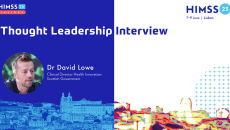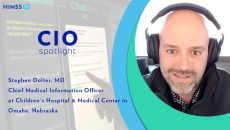AI
HIMSS24
Get news and views on hot topics including AI, cybersecurity, health equity and the evolution to nursing from the 2024 HIMSS Global Health Conference & Exhibition in Orlando.
China Medical University Hospital won the HIMSS Davies Award for refining care delivery with AI. Professor Oscar Lee, the hospital's vice superintendent, discusses the case studies submitted for award consideration and ongoing digital growth.
Professor David Lowe of the Scottish government discusses use cases of AI, including lung cancer detection, and the legal and ethical considerations around adopting AI.
Todd Gottula, president and cofounder of Clarify Health Solutions, discusses the importance of calculating and providing data intelligence to healthcare stakeholders to encourage adoption of AI and large language model insights.
Dr. Stephen Dolter, chief medical information officer at Children's Hospital and Medical Center Omaha, discusses the pros and cons of the evolution of AI in health and where future applications of AI may be useful in the clinical setting.
HIMSS23
HIMSS CEO Hal Wolf and Clalit's Chief Innovation Officer Ran Balicer discuss the highlights of HIMSS23, including the AI buzz that echoed in the halls because of its promise to transform care.
HIMSS23
ChatGPT has a lot of potential to improve healthcare, but it lacks the human touch and comes with ethical and legal issues, explains R. Ryan Sadeghian, CMIO of Hunterdon Healthcare System.
HIMSS23
John Gaines, VP of marketing at Cohere Health, describes the challenges providers face in getting prior authorizations and how new CMS guidelines will speed up the process by mandating that it be done electronically.
HIMSS23
Aaron Miri, SVP and chief digital and information officer at Baptist Health, discusses lessons his organization learned from HIMSS23 cybersecurity forum and how it's leveraging that info to keep patient data secure.
HIMSS23
Dr. Colin Banas, chief medical officer at DrFirst, discusses how his company uses AI to automate tasks such as processing prescription refills, which prevents medication errors and reduces clinicians' administrative burden.









